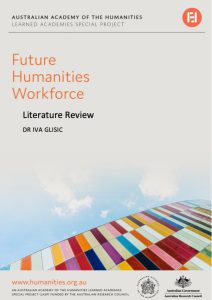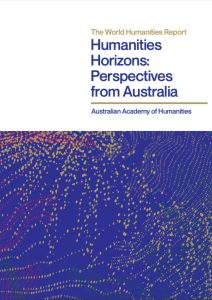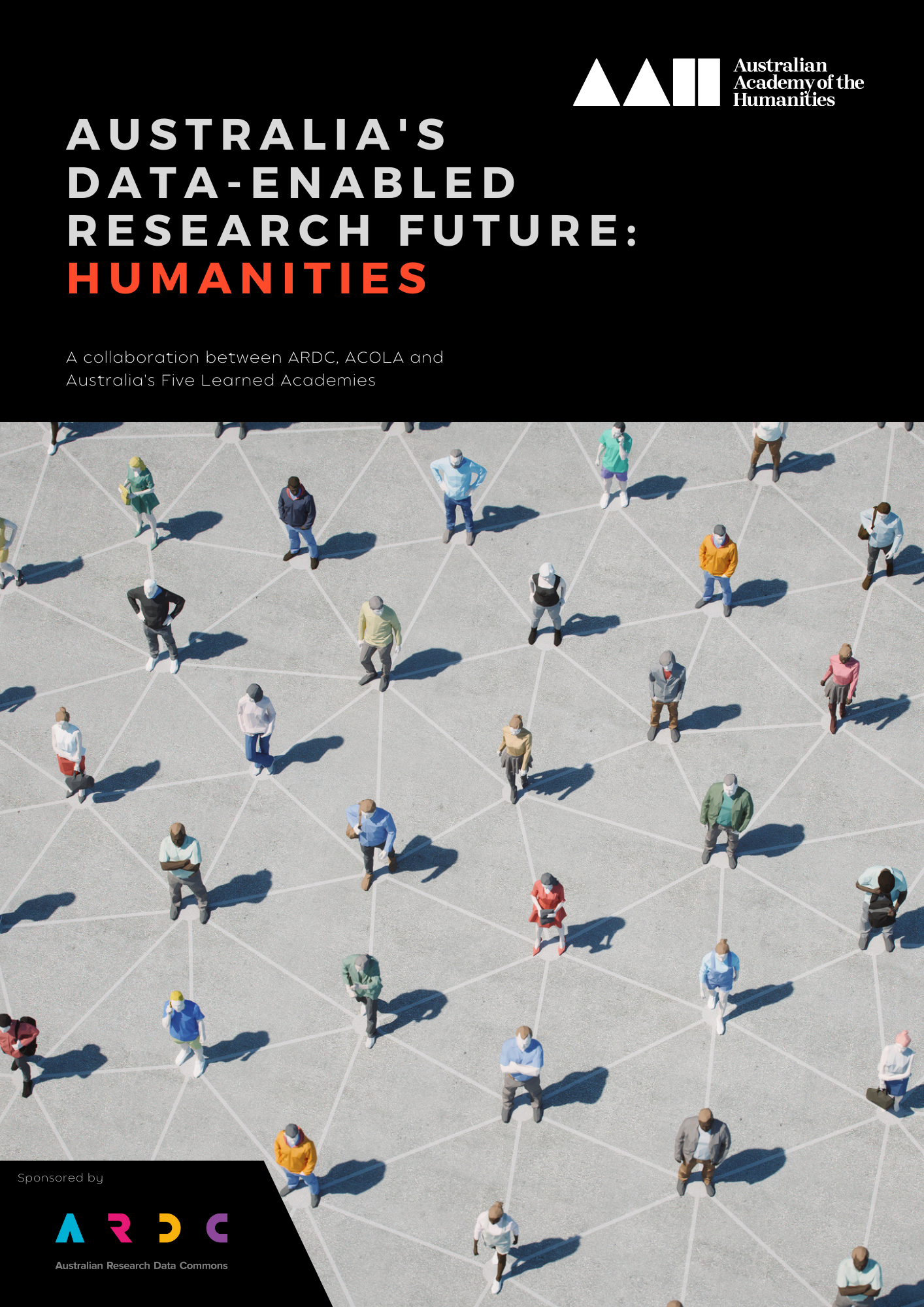The Future of the Humanities in Australia
Understanding Australia’s humanities workforce and planning for its future.
The Future Humanities Workforce report is a comprehensive and dynamic exploration of the state of the humanities in Australia now and the future.
Humanities’ capability is dispersed, untapped, and under-realised in Australia. How can Australia use humanities knowledges and problem-solving capabilities to solve the challenges we face now and in the future?
To ensure the sustainability of this workforce, we examine the knowledges and skills Australia needs in the future, demographics and capacity of our humanities workforce, the challenges it faces, and the strategies we can implement to secure its ongoing capacity and productivity.
A strong humanities workforce is fundamental to future Australia.
The Future Humanities Workforce Project was funded through the Australian Research Council’s Learned Academies Special Projects Scheme, which invests in the future of Australian research by providing funds to support strategic disciplinary initiatives.
Key findings
Australia’s humanities sector makes a vital contribution to the prosperity of our nation.
Humanities graduates comprise a vital part of Australia’s workforce, and our higher education and research ecosystem.
The humanities sector is bigger than previously thought but academic career paths for researchers and early-career teachers are declining and this, in turn, is leaving the sector vulnerable. We need to get better at promoting the range of career options for humanities graduates and supporting next-generation leaders in our universities.
Humanities graduates are trained in the skills employers want such as communication skills, creativity, problem-solving, leadership, emotional intelligence and critical thinking
Understanding the humanities today
Australia’s humanities sector is part of a broader Humanities, Arts and Social Sciences sector (known as SHAPE) that makes a major contribution to the national higher education, research and innovation system, and is a key workforce in Australia.
The acronym SHAPE stands for Social Sciences, Humanities and the Arts for People and the Economy or Environment. It was developed as a tool to tell the story of these subjects, which help us make sense of the human world, to value and express the complexity of life and culture, and to understand and solve global issues.
Census and labour market data consistently demonstrate that Australian humanities graduates underpin a number of vital sectors, including education, government, non-profits and start-ups.
Research and training in humanities disciplines builds capacity to articulate social and cultural understanding, enables effective international engagement, and contributes to economic productivity and innovation.
'Against a background of ongoing economic uncertainty and a rapidly transforming labour market, the concrete benefit and relevance of humanities training is often questioned in both political and broader public discourse.'
A highly employable workforce
The higher education sector is the locus of humanities research activity and the training ground for next-generation talent, while the cultural and creative, government and business sectors are key destinations for humanities graduates and expertise.
SHAPE disciplines account for 59 per cent of all undergraduate and postgraduate course enrolments across Australia, and there is strong evidence that these students derive great satisfaction from their studies, and enjoy positive employment outcomes.
One of the greatest challenges of a future job market is the new jobs that will emerge and the hybridisation and transformation of current jobs. One study suggests that most current Australian high school students will have 17 different jobs and go through five career changes once they complete their formal education.
These jobs will require the skills humanities graduates are trained in, and continuously develop, throughout their careers.

Futher reading...
Mapping the creative economy - an Australian breakthrough
Australia’s creative economy is far larger and more dynamic than previously thought, and knowing the full extent may fuel "Australia's next boom".
Skills of the future
Concerns for the future workforce
The singular advantage of humanities training to the Australian workforce is that rather than prepare graduates for a single, specific job, many of which are exposed to obsolescence or automation, they develop enduring skills, knowledge, and modes of reasoning alongside specialist knowledge.
These skills are beneficial in a wide range of career options, and provide the ‘learning to think’ skills that make for a highly adaptable and ‘transition ready’ workforce that can adjust to changing patterns of work and skills requirements.
-
Limited succession planning in academia
There are significant challenges for the academic workforce, in the wake of COVID-19 impacts, and fuelled by diminished numbers of ongoing full-time positions, impacting teaching and research. - Growing casual workforce in higher educationSeveral systemic issues undermine the humanities, including gendered employment patterns, an increase in casual employment, and poor career prospects and pathways for early career researchers and teachers.
-
A 'hostile' view of the humanities
The erosion of fundamental research funding and the dominant focus on the capability of STEM fields combined with the apathetic (at best) public perception of the value of a humanities education continue to chip away at the resilience of the sector.

Futher reading...
Why we need humanities graduates in our workforce
Education’s distinct purpose is to be forward-thinking, but university fee structures are short-sighted. Under the changes, students studying humanities, arts and social sciences are worse off says Professor Joy Damousi FAHA FASSA.
Australian humanities & global perspectives
'Promoting knowledge of Australia’s distinctive ancient and living Indigenous cultures to domestic and international audiences . . . is the single most important distinctive feature of Australian humanities in a global context.'
Emeritus Professor Louise Edwards FAHA & Dr Christina Parolin FAHA
For over sixty-thousand years, Aboriginal and Torres Strait Islander peoples have practised and documented traditions, histories, knowledges and ontologies.
Australian Indigenous knowledge systems offer a transformational perspective on 21st century humanities issues, from environmental sustainability and restorative justice to cultural competence and engaged social policy—but drawing on these insights requires a national compact underpinned by genuine reciprocity and reparation.
What makes Australia unique?
-
Australian humanities are multidisciplinary.
The expansion of higher education in the 70s and 80s led to various multidisciplinary areas of studies, including cultural studies, multicultural studies, gender studies, and the environmental humanities.
-
Australian humanities combine Indigenous and western knowledge.
Australian universities continue to develop Indigenous-led research across the humanities, with Indigenous and non-Indigenous scholars focusing on contemporary challenges including climate change & environmental conservation.
-
Australian humanities graduates underpin a number of vital sectors
This includes education and publication administration, and have strong employment outcomes especially over the long term. Career paths and prospects for early-career teachers and researchers in our university system are declining and we have to do more to recognise and reward this cohort.
Recognition of Indigenous Australian culture
Indigenous and non-Indigenous humanities scholars have been instrumental in overturning the notion that the British “settled” unoccupied land. Scholars of comparative colonialism note significant commonalities in British responses to resistance to their rule in South Africa, New Zealand, Australia, and Canada and in so doing have identified aspects that are distinct to the Australian experience.
Archaeologists and historians have researched the productive and social organisations of Indigenous peoples, drawing on extensive archaeological, textual, and oral sources, and presented these in both academic and popular books. They have exposed the frequent brutality of colonisation and also revealed the complexity of Indigenous cultures.
Researchers have explored the history of Aboriginal resistance to dispossession of land, the taking of children, wage theft, and slavery, as well as systemic institutional and bureaucratic abuse, to present a vision of Aboriginal survival and resilience.
Coming to terms with the impact of colonisation on Indigenous Australians was the core of Australia’s culture wars in the late 1990s and early 2000s. Humanities scholars were accused of rewriting the history of colonisation for partisan political goals, promoting “black armband history” and “intergenerational guilt” rather than national pride.
Emeritus Professor Louise Edwards FAHA & Dr Christina Parolin FAHA
Indigenous-centred approaches to research at scale
New investments through the Australian Research Council (ARC) Centres of Excellence scheme are supporting Indigenous-centred approaches to research at scale.
Led by Distinguished Professor Sean Ulm FAHA FSA MAACAI, and Deputy Director, Distinguished Professor Lynette Russell AM FAHA FASSA, the ARC Centre of Excellence for Indigenous and Environmental Histories and Futures (CIEHF) will “bring Indigenous and environmental histories to the forefront of land and sea management.”
The ARC Centre of Excellence for the Elimination of Violence Against Women (CEVAW) led by Professor Jacqui True FASSA and Professor Bronwyn Carlson FAHA, Deputy Director Indigenous, “mobilises survivor-centric and Indigenous methodologies, interdisciplinary collaborations, and Indo Pacific partnerships to deliver scalable approaches to eliminate violence against women”.
The ARC Centre of Excellence for Indigenous Futures, led by Professor Brendan Hokowhitu, “aims to transform and improve the life chances of Indigenous Australians by utilising Indigenous knowledges in unique trans-disciplinary cross-sector designed research to enhance our understanding about the complex nature of Indigenous intergenerational inequity”.
Further reading
Australia’s capacity to undertake and apply humanities research relies on the quality and sustainability of its data and infrastructure, and the robustness of its training and workforce capability. This Environmental Scan provides an overview of the current landscape for humanities data-enabled research and identifies strategic needs and requirements, gaps in infrastructure, and potential opportunities for leadership, advocacy, and planning.
Coming soon
Forthcoming reports:
- Future Humanities Workforce: Synthesis Report
- Future Humanities Workforce: Data Report
- Future Humanities Workforce: Gender Equity in the Humanities Report
About the Future Humanities Workforce Report
Led by former Academy president and ARC Laureate Fellow Professor Joy Damousi FASSA FAHA, the project team includes:
This project was funded by the Australian Research Council through the Learned Academies Special Projects scheme. The scheme invests in the future of Australian research by providing vital funds to the Learned Academies to support strategic disciplinary initiatives.
Keep informed of the Academy’s work
Subscribe to our newsletter to be informed of current and upcoming projects, policy news and report releases.



